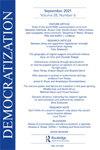Individual or collective rights? Consequences for the satisfaction with democracy among Indigenous peoples in Latin America
IF 2.9
1区 社会学
Q1 POLITICAL SCIENCE
引用次数: 0
Abstract
ABSTRACT For decades, Indigenous peoples and their movements have fought for the recognition of their rights. Since the multiculturalist turn, these demands are – at least partially – a legal reality in many countries in Latin America. Indigenous group rights can be attributed to individual group members or in a collective way to the group as such. Here, I investigate how these contrasting approaches impact on Indigenous citizens’ satisfaction with democracy. From normative theory, I derive the expectation that incorporating collective Indigenous rights increases satisfaction with democracy, because they address the historical loss of Indigenous sovereignty and open new spaces for the participation of previously marginalized groups. In contrast, the individualization of Indigenous group rights can be seen as a form of assimilation. The empirics show that collective rights increase the satisfaction with democracy among Indigenous peoples – and among the wider public. Thus, recognizing collective minority rights does not seem to stir division but sends a message that democracy is working well.个人权利还是集体权利?拉丁美洲土著人民对民主感到满意的后果
几十年来,土著人民和他们的运动一直在争取他们的权利得到承认。自从多元文化主义转向以来,这些要求在拉丁美洲的许多国家至少部分地成为法律现实。土著群体的权利可以归于个别群体成员,也可以集体地归于群体本身。在这里,我调查了这些截然不同的方法如何影响土著公民对民主的满意度。从规范理论中,我得出这样的期望,即纳入土著集体权利会增加对民主的满意度,因为它们解决了土著主权在历史上的丧失,并为以前被边缘化的群体的参与开辟了新的空间。相比之下,土著群体权利的个体化可被视为同化的一种形式。这些经验表明,集体权利增加了土著人民——以及更广泛的公众——对民主的满意度。因此,承认少数群体的集体权利似乎不会引起分裂,而是发出了民主运作良好的信息。
本文章由计算机程序翻译,如有差异,请以英文原文为准。
求助全文
约1分钟内获得全文
求助全文
来源期刊

Democratization
POLITICAL SCIENCE-
CiteScore
6.40
自引率
12.50%
发文量
73
期刊介绍:
Democratization aims to promote a better understanding of democratization - defined as the way democratic norms, institutions and practices evolve and are disseminated both within and across national and cultural boundaries. While the focus is on democratization viewed as a process, the journal also builds on the enduring interest in democracy itself and its analysis. The emphasis is contemporary and the approach comparative, with the publication of scholarly contributions about those areas where democratization is currently attracting considerable attention world-wide.
 求助内容:
求助内容: 应助结果提醒方式:
应助结果提醒方式:


